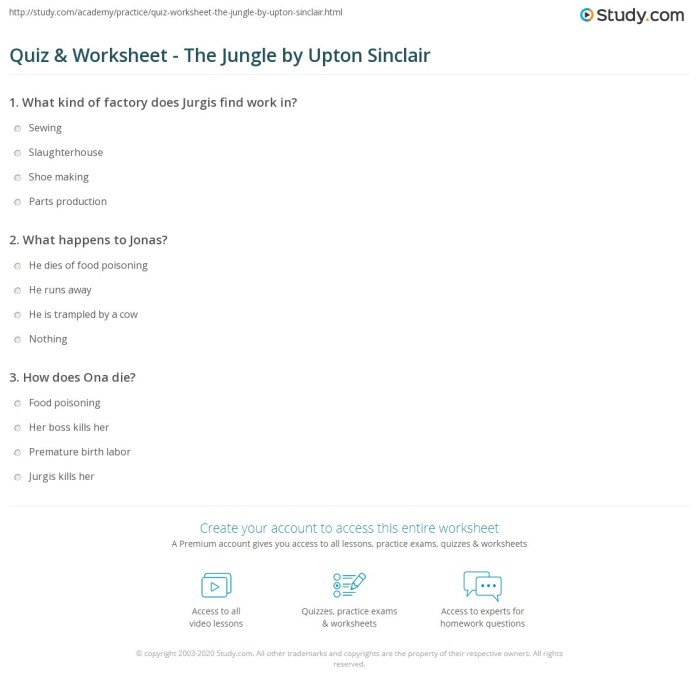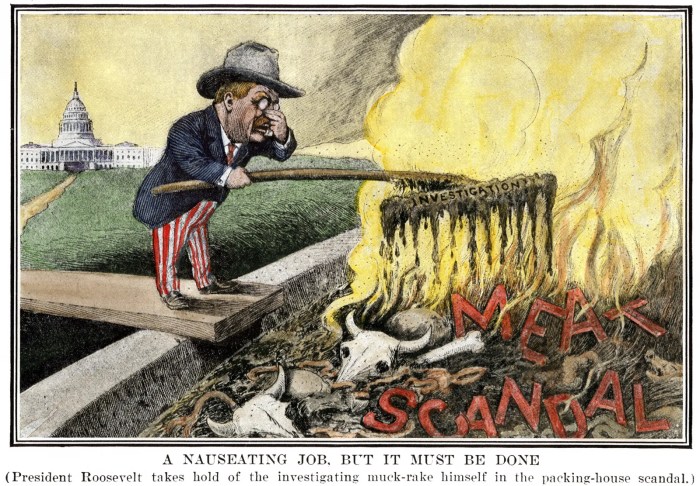The Jungle by Upton Sinclair Worksheet Answers delves into the depths of Upton Sinclair’s groundbreaking novel, providing a comprehensive guide to its historical context, literary techniques, and profound themes. Through a meticulous analysis of the novel’s characters, plot, and social commentary, this resource offers an invaluable tool for students and readers alike to engage with this American literary masterpiece.
Upton Sinclair’s The Jungle, published in 1906, sparked a national outcry against the unsanitary and exploitative conditions within the meatpacking industry. This novel’s searing indictment of social injustice, poverty, and corporate greed resonated deeply with readers, leading to significant reforms in the food industry and labor practices.
The Jungle by Upton Sinclair
Upton Sinclair’s The Jungle, published in 1906, is a groundbreaking work of American literature that exposes the appalling conditions within the meatpacking industry during the early 20th century. It played a pivotal role in the passage of the Pure Food and Drug Act and the Meat Inspection Act, and remains a powerful indictment of social injustice and corporate greed.
The novel’s central themes include the exploitation of immigrant workers, the dangers of unregulated capitalism, and the importance of social reform.
Character Analysis

Jurgis Rudkus
Jurgis Rudkus is the protagonist of The Jungle, a Lithuanian immigrant who arrives in Chicago with dreams of a better life. However, he quickly finds himself trapped in a cycle of poverty and exploitation. Despite his struggles, Jurgis remains a hopeful and determined character, and his journey reflects the experiences of countless immigrants who came to America seeking opportunity.
Ona Lukoszaite, The jungle by upton sinclair worksheet answers
Ona Lukoszaite is Jurgis’s wife, and she shares his dream of a better life in America. However, she is also a victim of the meatpacking industry, and her experiences highlight the plight of women in the early 20th century.
Minor Characters
The novel features a cast of minor characters who play important roles in Jurgis’s story. These characters include:
- Marija Berczynskas: Jurgis’s mother-in-law, who represents the traditional values of the Lithuanian immigrant community.
- Tamoszius Kuszleika: Jurgis’s cousin, who introduces him to the meatpacking industry.
- Jonas Lukosza: Ona’s father, who is a skilled butcher and union organizer.
Literary Techniques
Sinclair employs a variety of literary techniques in The Jungle, including naturalism, symbolism, and foreshadowing.
Naturalism is a literary movement that seeks to portray life in a realistic and unsentimental way. Sinclair uses this technique to depict the harsh realities of the meatpacking industry, and the lives of the immigrant workers who toil in it.
Symbolism is the use of objects or events to represent abstract ideas or emotions. In The Jungle, the meatpacking industry is a symbol of the greed and exploitation that is rampant in American society.
Foreshadowing is the use of hints or clues to suggest what will happen later in the story. Sinclair uses foreshadowing to build suspense and to create a sense of dread as the novel progresses.
Social and Historical Context: The Jungle By Upton Sinclair Worksheet Answers

The Jungleis set during the Progressive Era, a time of great social and economic change in the United States. The novel reflects the concerns of the Progressive Era reformers, who were working to address the problems of poverty, inequality, and corporate corruption.
The meatpacking industry was a major target of Progressive Era reformers. The industry was known for its unsanitary conditions, its use of child labor, and its low wages. The Junglehelped to expose these conditions to the public, and it played a role in the passage of the Pure Food and Drug Act and the Meat Inspection Act.
Answers to Common Questions
What is the significance of The Jungle by Upton Sinclair?
The Jungle is a groundbreaking novel that exposed the unsanitary and exploitative conditions within the meatpacking industry, leading to significant reforms in the food industry and labor practices.
Who is the protagonist of The Jungle?
The protagonist of The Jungle is Jurgis Rudkus, a Lithuanian immigrant who experiences the harsh realities of life in the Chicago stockyards.
What literary techniques does Sinclair employ in The Jungle?
Sinclair employs various literary techniques in The Jungle, including naturalism, symbolism, and foreshadowing, to enhance the novel’s realism and emotional impact.
What are the main themes explored in The Jungle?
The main themes explored in The Jungle include social injustice, poverty, the meatpacking industry, and the immigrant experience.